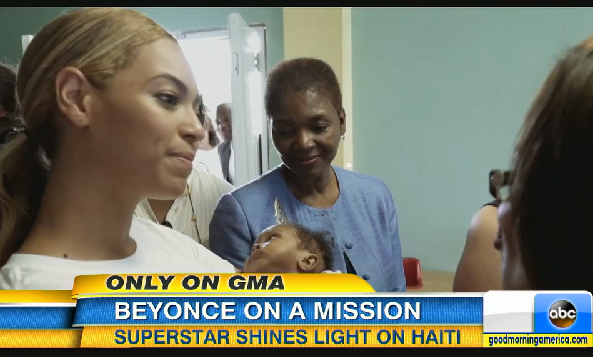St. Damien Pediatric Hospital News
| About the Fund | Make a Gift to the Fund | Become a Sustainer | Programs | News | Blog | Fundraisers Guide (PDF) |
…
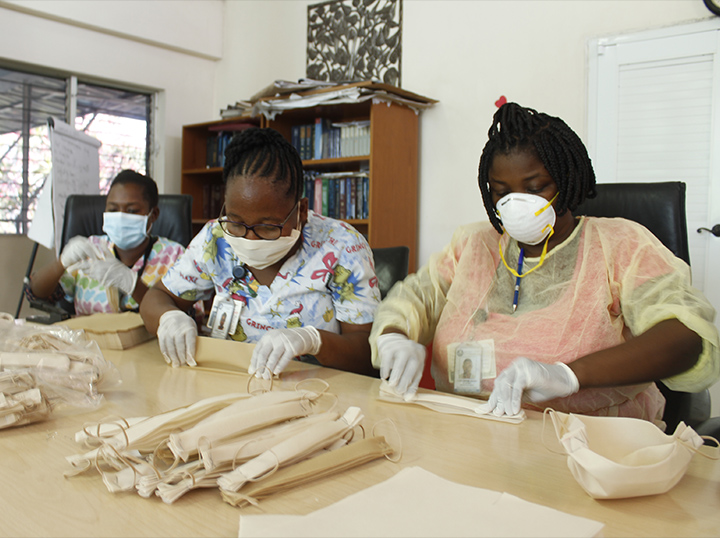 St. Damien Sews Face Masks To Save Money and Lives
St. Damien Sews Face Masks To Save Money and Lives
May 1, 2020
Before the outbreak of COVID-19, personal protective equipment (PPE) was something one might have assumed all hospitals and healthcare centers have in abundance; however, due to the severity of the novel coronavirus and the ease of contagion, increased demand and skyrocketing costs for PPE around the world have left many healthcare institutions struggling to obtain sufficient gear for doctors, nurses, and administrative staff working in direct contact with suspected COVID-19 cases.
Haiti, the poorest country in the Western hemisphere, is no exception. As of May 1st, according to the Johns Hopkins Coronavirus Resource Center, there are 81 confirmed cases of COVID-19 in the country. Due to the weak public health system and widespread lack of testing, the true number could be significantly higher. There are credible fears among experts that COVID-19 could escalate beyond the healthcare system’s ability to handle the situation.
To help protect staff and patients, St. Damien Pediatric Hospital quickly stocked up on face masks, which have become critical PPE in the effort to slow the spread of COVID-19, especially in healthcare environments. Medical staff of St. Damien, the only hospital in Haiti that specializes in treating children with respiratory illnesses, have been encouraging the public to use face masks and practice social distancing. In addition, the hospital has been making its own hand sanitizer.
Suffice to say, the immediate massive increase in the use of face masks at the hospital has been a challenge. According to St. Damien’s head of pharmacy Romel Cajuste, before the outbreak of the COVID-19 pandemic, the hospital used 5,025 surgical masks per month while current usage has increased to an average of 7,500 per month.
“Furthermore, the cost of face masks has increased dramatically due to the increase in demand. In December 2019, surgical masks cost around 8 cents each. They are now $0.40 each. Similarly, specialized N-95 masks, which cost $1.84 each in December, are now $2.40 per mask. These sudden increases are difficult for healthcare institutions like ours to manage. Besides, often the quantity ordered is not what is shipped. For example, for a recent order of 5,000 masks, only 998 were delivered,” explains Romel.
By effectively managing our inventory, St. Damien had been able to avoid a face mask shortage, however, at the beginning of March, management realized the hospital could not bear the cost of buying single-use disposable face masks long-term.
In a stroke of creative ingenuity, Dr. Margareth Narcisse recommended that St. Damien began making its own masks in order to save money and ensure the hospital has a steady supply going forward.
Since then, nurses and staff at St. Damien have been sewing masks for the hospital using 100% polyester fabric, elastic bands, and clips ordered in kits from a supplier in Port-au-Prince. “We have made 4,900 masks, which is extraordinary!” says Dr. Narcisse. What’s more?! The total supply cost to make the first batch of face masks came to $246.23, which amounts to only about 5 cents per mask!
During unprecedented and trying times like these, the dedication, collaboration, and compassion of the entire St. Damien family – including YOU – is an integral part of what makes our life-saving work possible.
Key Progress Points from the 2010 Earthquake
Reported by Damarie Egide Voight, Communications Officer, St. Damien Pediatric Hospital
January 1, 2020
On January 12, 2010, a 7.0 magnitude earthquake devastated the impoverished nation of Haiti. NPH/NPFS lost staff, volunteers, and family members, and suffered a great deal of physical damage. Fortunately, the St. Damien Pediatric Hospital facility was not seriously harmed and thanks to a dedicated team, was able to provide assistance to thousands of people, as well as develop and expand various programs. Following are some highlights from the 10 years since the earthquake.
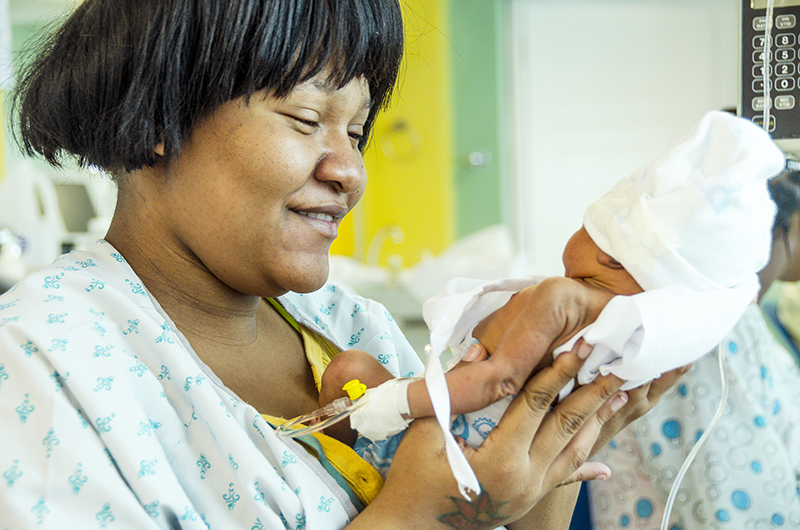 1. Launch of maternity and neonatology programs
1. Launch of maternity and neonatology programs
The St. Damien Neonatology unit is one of only five neonatology departments available in the country. Since neonatal deaths accounts for half of the whole pediatric mortality rate, St. Damien is thrilled to bring this invaluable service to the country. Although progress was made in Haiti, cutting by 20% the pediatric mortality rate in the country, the neonatal death rate has remained unchanged for the last 15 years.
• 2,000 high-risk pregnancies per year – Began in 2010
50+ hospitals were badly damaged in the earthquake. Woman were coming to St. Damien after the earthquake because they were ready to give birth and had nowhere to go. The program developed throughout the years to focus on high-risk pregnancies in conjunction with the neonatal unit.
2. Responding to Rehydration and Cholera epidemic
NPH and partner, the St. Luke Foundation, sprang into high gear when cholera emerged in Haiti, just 10 months after the earthquake.
Paho.org In Haiti, since the beginning of the epidemic (October 2010) and until EW 23 of 2014, there have been 703,510 cholera cases, of which 393,912 were hospitalized (56 %) and 8,562 died. The cumulative case-fatality rate remains 1.2 %, with variations ranging from 4.4 %, in the department of Sud Est to 0.6 %, in Port-au-Prince.
3. Job creation and training
Offering more specialty services and programs creates more employment. NPH Haiti over the past five years has offered numerous staff opportunities to travel abroad for training or intensive in country training. Examples; ICU, surgery, general pediatrics, suture and wound techniques, pediatric HIV, ultra sound, screening applicants for US immigration, compassion care, project management, communication, Crisis Prevention training, childcare training – discipline with dignity, teaching skills for educators.
4. Pediatric Residency Program
There is a severe shortage for specialty training for medical graduates in Haiti. Only 60% of them have access to a residency program. Furthermore, only 300 pediatricians are in function in a country where 30% of the 10 million inhabitants are children under 15 years of age. St. Damien, with over 20 years’ experience in managing pediatric healthcare, decided to work at decreasing this severe gap.
NPH Haiti launched a two-day Nursing conference in 2018 and 2019. 200 nurses and nursing students attended: from St Damien and other institutions, it was the first and very successful conference organized by the nursing staff led by the nursing director. It allowed continuing education, St Damien nurses were proud to present the results of their work. Seven 2nd year residents began in 2013, and six first year residents began in 2014.
5. Strengthening the Infection Control Committee
Every year Haiti faces nosocomial infections outbreaks, leading to increased expenses and at time deaths. Currently our committee is more structured with the addition of a prevention nurse. Weekly meetings, activities of training, education activities around hand washing international days, increasing usage of hand sanitizers.
6. Oxygen availability in most wards, central system
Installation work supported by Fondazione Rava: With oxygen available in most rooms NPH can maneuver children from the emergency rooms to the other wards quickly without concerns about the oxygen levels in other wards.
7. One pediatrician completed her specialization in pediatric cardiology and started to work in November 2018.
Her training was supported by Gift of Life international. The NPH German office offered some support for this training as well as the development of a new cardiac clinic. we have a cohort of 800 children receiving cardiac care. They all depended for their assessment and care on visiting cardiologists every other month or on a quarterly basis. Now the care is always available for children with heart diseases. Follow-up care of children who received cardiac surgery during GOLI missions will not depend only on outside teams.
Read: “Fr. Rick Frechette: Fake News Has Real Consequences in Haiti”
Psychology Today Blog
September 29, 2019
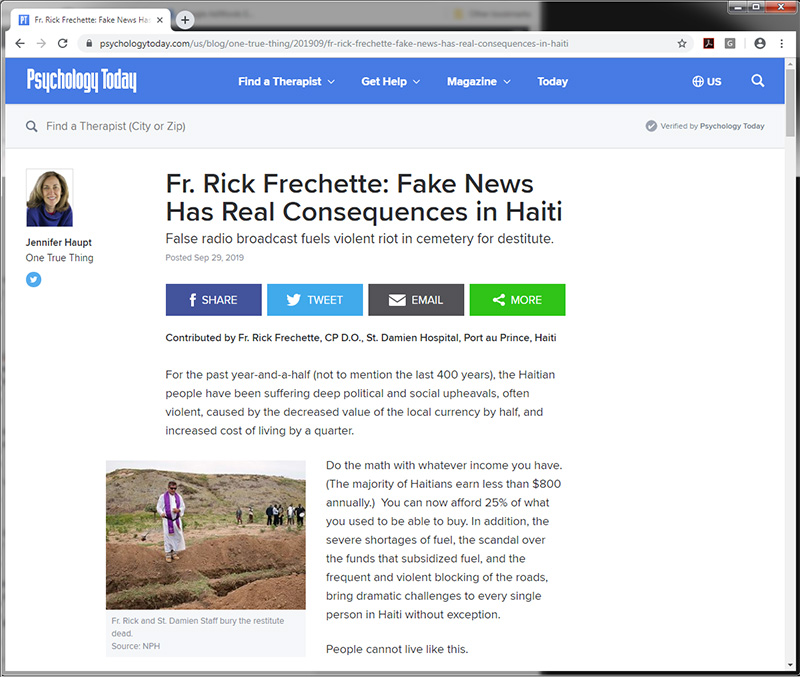
Read: Singer-songwriter, Cause-artist Angelo Rose to Release ‘Glisten’ on August 30th/proceeds to St. Damien Pediatric Hospital
Vents Magazine
July 15, 2019

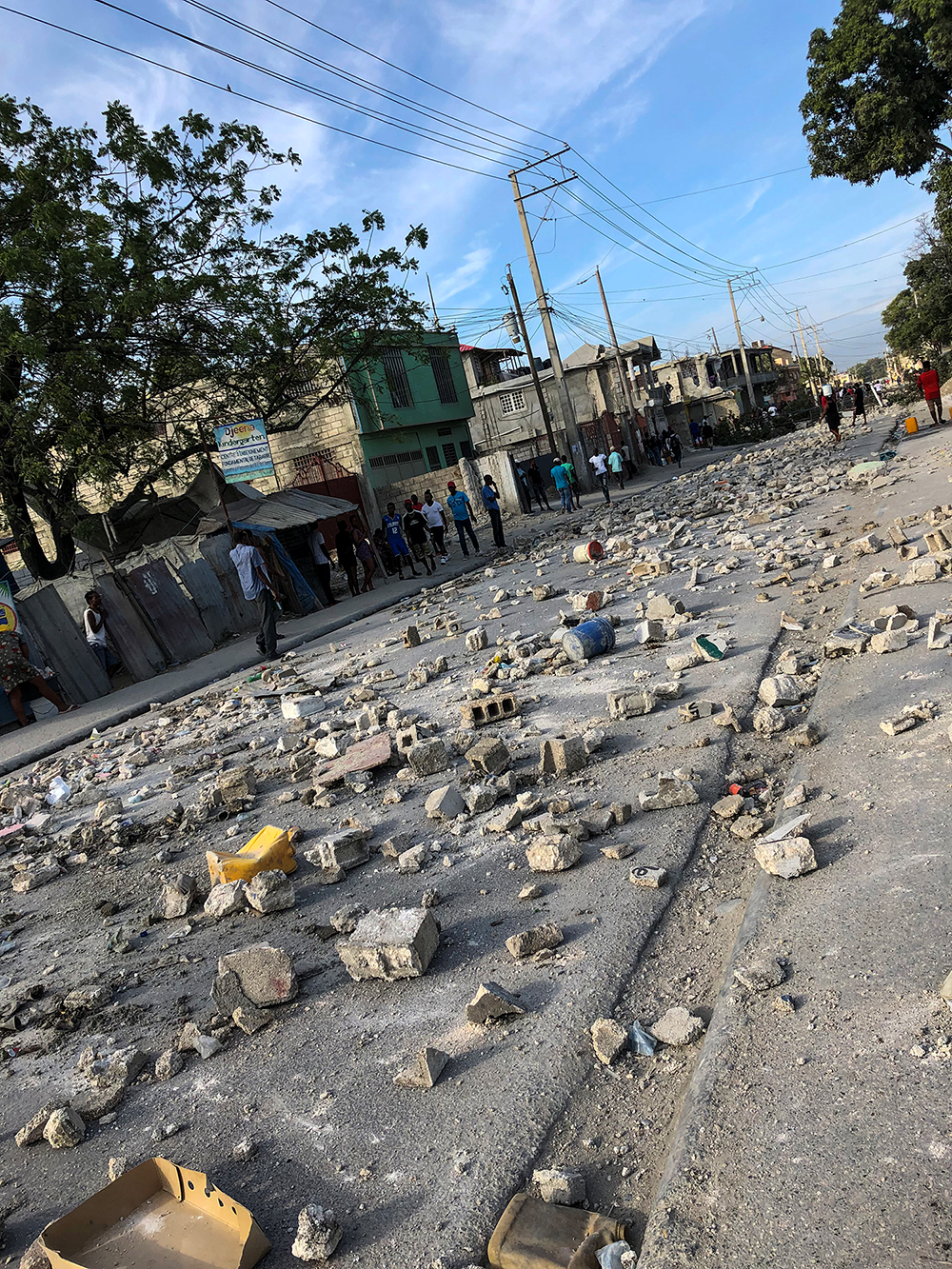
Emergency Crisis at St. Damien
Reported by Dr. Jacqueline Gautier, Medical Director, St. Damien Pediatric Hospital
February 14, 2019
Due to heavy rioting and protests, Port-au-Prince and surrounding areas that include St. Damien Pediatric Hospital have been on lockdown since February 7. Since then, St. Damien has been functioning in emergency mode, with the managing staff being present at all times to coordinate activities and keep the hospital open and functioning 24/7.
St. Damien continues to provide high quality care to all children in need and women in labor. We have removed admission criteria due to the impossibility of referring women in labor elsewhere. We continued to provide chronically ill children with life-saving care, including medication, and meals.
We are also providing transportation via ambulances for all employees, most of whom have graciously accepted to work 24-hour straight shifts in order to minimize movement and traffic.
As a result of these emergency measures, our fuel reserves are quickly diminishing, which will soon lead to power shortages and difficulties with transportation.
St. Damien is accruing additional expenses for meals for all employees—even for certain patients’ family members—and housing for employees who are obliged to remain in the hospital until the following morning in order to reduce fuel consumption and maximize safety by making fewer daytime trips.
We are facing tremendous challenges. We ask for your generous donations in order to remain open and continue providing care to this population in distress.
Photo taken by Denso Gay, Communication Officer, NPH Haiti, on his way to work on February 15, 2019
…
Fr. Rick Frechette Addresses the Political Situation in Haiti ->
Read: Little Theatre to screen documentary showcasing Haiti hospital helped by Pittsford church
Rochester Democrat and Chronicle
October 19, 2018
Features video: “Rochester Storytellers Project: Angelo Rose”
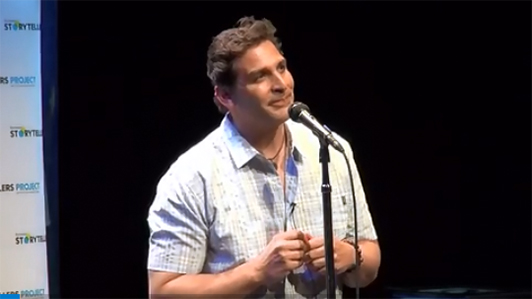
Watch Video/Read Article
Read: “Young Cancer Patients in Poor Countries Get a Boost”
by Lucette Lagnado
The Wall Street Journal
September 26, 2018
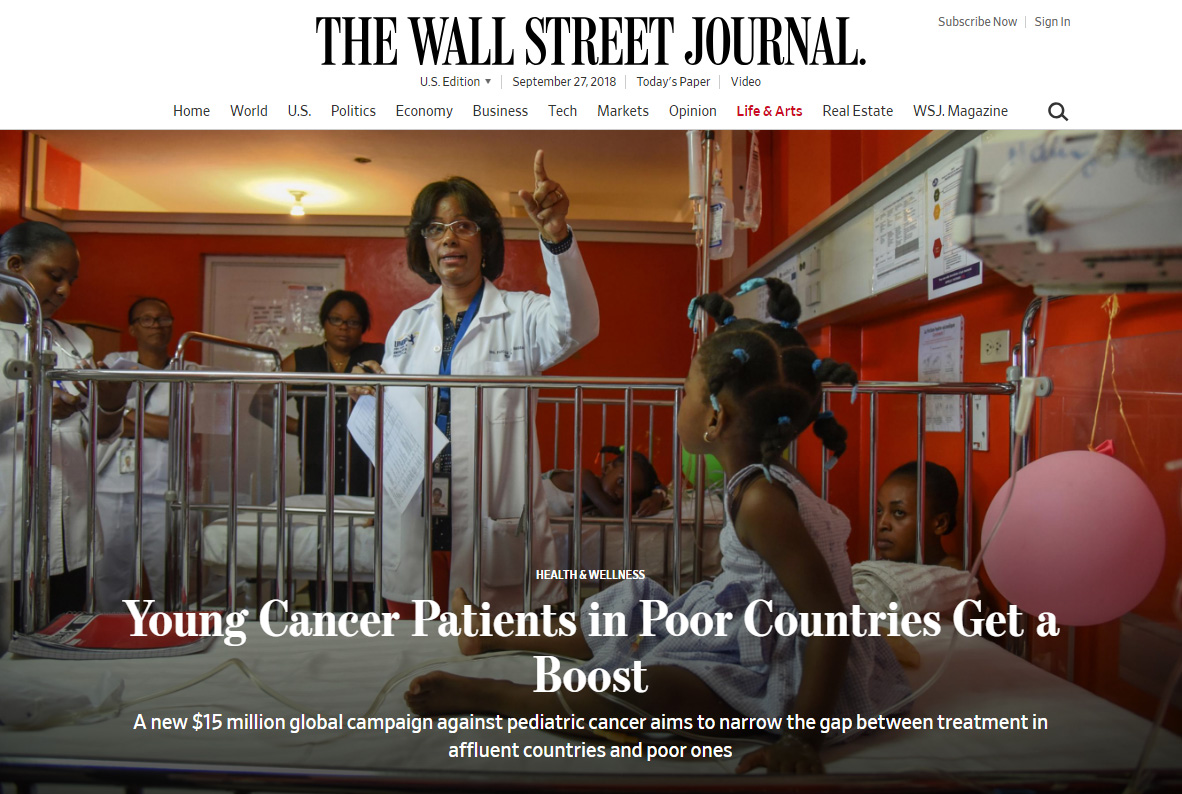
WATCH: Heartbreaking Video of Haitian Children’s Hospital After Horrific 2010 Earthquake
Atlanta Journal-Constitution
January 12, 2018
AJC photojournalist Elissa Eubanks went to Haiti shortly after the quake along with reporter Péralte C. Paul.
Eubanks recorded video of the experience, in which she shares the plight of children at St. Damien Hospital in Port-au-Prince, Haiti.
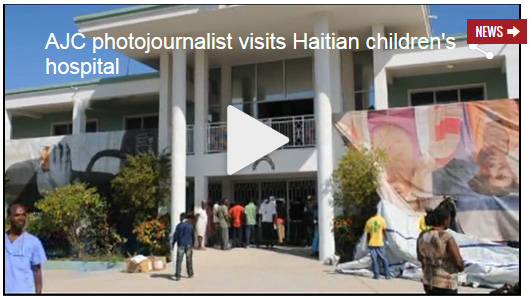
Watch Video
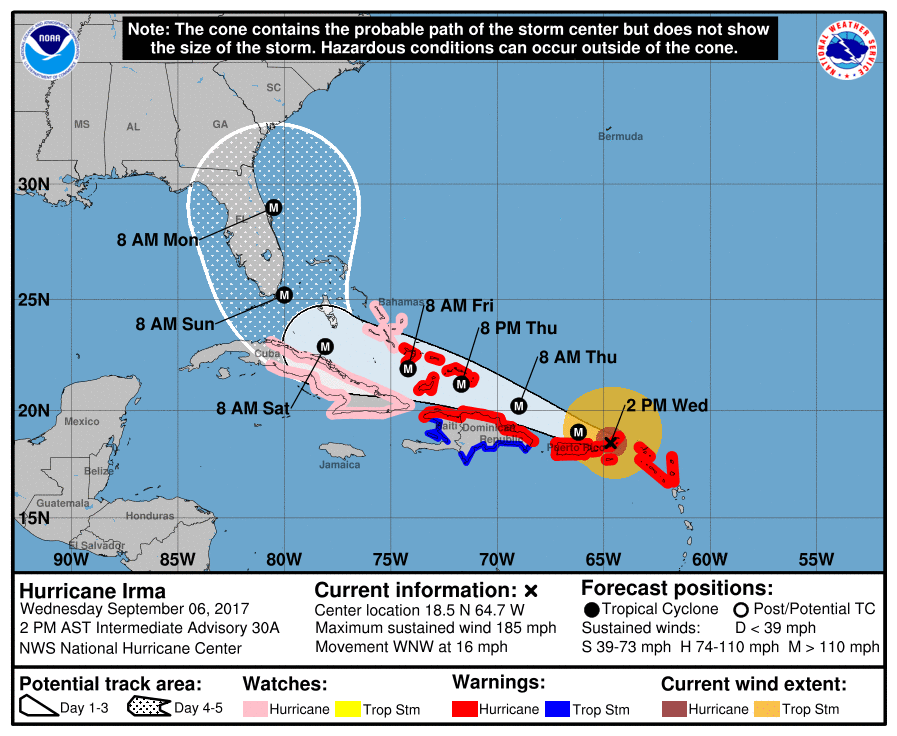 St. Damien’s Braces for Hurricane Irma
St. Damien’s Braces for Hurricane Irma
September 7, 2017
As of today at 5 a.m. EST, Hurricane Irma, a catastrophic Category 5 storm, was just north of Haiti and the Dominican Republic. Our team in Haiti is expecting flooding, mudslides and road blockage due to debris.
Our staff is setting up to work overtime shifts of 48 to 72 hours and has stocked extra food for those who cannot leave. We predict receiving a large number of patients in the days following the storm due to trauma, diarrhea, malaria, dengue, filariasis, and cholera that can be caused by the lack of safe drinking water.
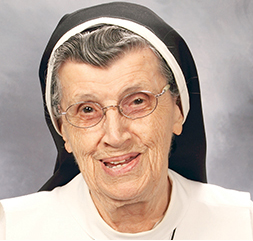 Former Residents of Orphanage in Haiti Still Influenced by Sister Philomena Perreault
Former Residents of Orphanage in Haiti Still Influenced by Sister Philomena Perreault
From Adrian Dominican Sisters – What’s Happening
August 17, 2017
“We came to a family – a home. I didn’t feel like an orphan.”
That was the sentiment of Alfredo Benitez and other former residents of an orphanage in Haiti during a recent visit with Sister Philomena Perreault, OP, at the Adrian Dominican Motherhouse. Sister Philomena, Father Richard Leo Frechette, and other staff members of the Nos Petit Frères et Soeurs (NPFS) “My Little Brothers and Sisters” orphanage in Haiti accepted the 500 young residents as part of a large family.
Sister Philomena was among the group that founded NPFS in 1988; she ministered there for about 15 years, taking special care of the babies, serving as nurse for all of the children, and training the older children to take care of the babies. She then felt called to make use of her training as a licensed practical nurse to serve in the mobile medical clinic in Haiti.
NPFS is one of the orphanages established by Nuestros Pequeños Hermanos (NPH) International, a Christian organization that founded and runs orphanages in Latin America and the Caribbean. Founded in 1954 by Father William B. Wasson, NPH strives to provide a permanent family and home for children who are orphaned, abandoned, or suffering the effects of living in extreme poverty.
Ten former residents, staff members, and volunteers came to Adrian August 14-15 to visit Sister Philomena and to express their gratitude for the positive influence she made on their lives.
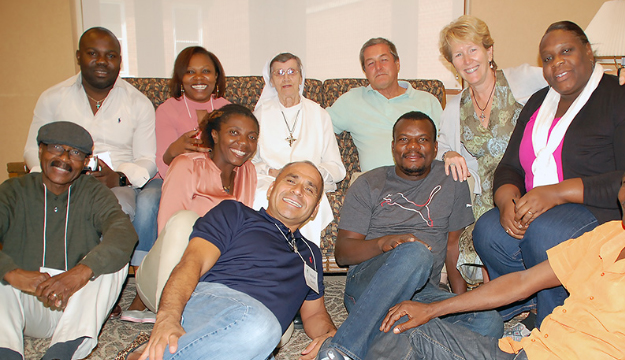
Visiting with Sister Philomena Perreault, OP, seated in the center, are: on floor, from left: Dr. Malherbe Desert, Roseline Paul, Alfredo Benitez, Raphael Louigéne, and Claude St. Hilaire; seated on furniture, from left: Jean Nebez Augustin, Dreléne Augustin Reache, Father Richard Leo Frechette, Mary Reed, and Nadine Dédé.
“The house was a love house, and when you come, you really feel the love,” said Nadine Dédé, who, as a resident, was trained to care for the babies and returned after attending secretarial school. She recalled the framed plaque in the orphanage: “Love is an action word.”
“We were big girls taking care of the little ones,” Nadine recalled. “She taught us how to love them, how to carry them, how to feed them and change them. We learned a lot from her.”
Roseline Paul began at the age of 10 to help Sister Philomena take care of the babies. “I was very happy to be with Sister and learn a lot, because she loved our little babies and took care of them.” She recalled that Sister Philomena slept with babies who were crying the hardest to give them comfort and a sense of security.
“She was giving 24 hours a day,” recalled Mary Reed, a U.S. volunteer who had served with Sister Philomena. “She took care of the sickest of the sick. I’d be sleeping-walking and Sister – who was a few years older than me – would be up all night with crying, screaming babies.”
Father Rick, who worked with Sister Philomena in Haiti for years – and who still serves in Haiti – recalled the sacrifice that Sister Philomena made when she switched ministries from the orphanage to medical work. The orphanage was high in the mountains – about 1,300 meters – and Sister Philomena moved to the hot climate of the slums of Port au Prince to work in the medical field.
“We worked off the back of a truck, in very poor areas, bringing X-rays and medicines and taking care of people with tuberculosis, malaria, and diabetes – and so many people with AIDS,” Father Rick said. Because of the political turmoil in Haiti at the time, the medical team also healed people who had been shot or beaten.
Perhaps most heart-breaking of all, Father Rick said, was the number of children who died every day – often five to 10 children — whose bodies Sister Philomena washed and buried after morning Mass. “They die from malnutrition, lack of medicine for the simplest illnesses, pneumonia, gastroenteritis, malaria, dengue, cholera, tuberculosis – infectious diseases.”
Raphael Louigéne, who worked with her on the medical team, recalled Sister Philomena’s precision in caring for sick children. When she gave out medicine for the children, “She wanted to be sure that the mothers mixed the medicine with clean water so that the medicine wouldn’t be ruined by something that would cause another sickness. Sister was very precise and disciplined in making sure that the children were cared for.”
Sister Philomena’s love for children and diligence in caring for them had a profound influence on those she had served in the orphanage. Many, in turn, have become involved in various NPH programs.
“I gave my service in Haiti, Mexico, and Honduras,” Alfredo Benitez said. “To me, Sister Philomena speaks of kindness and compassion toward human life, as well as simplicity of life.”
For her part, Sister Philomena enjoyed the gathering of people she once had served or served with in her beloved Haiti – in spite of the hardships involved in her ministry there. “I would go back in a minute,” she said. “My heart is still there.”
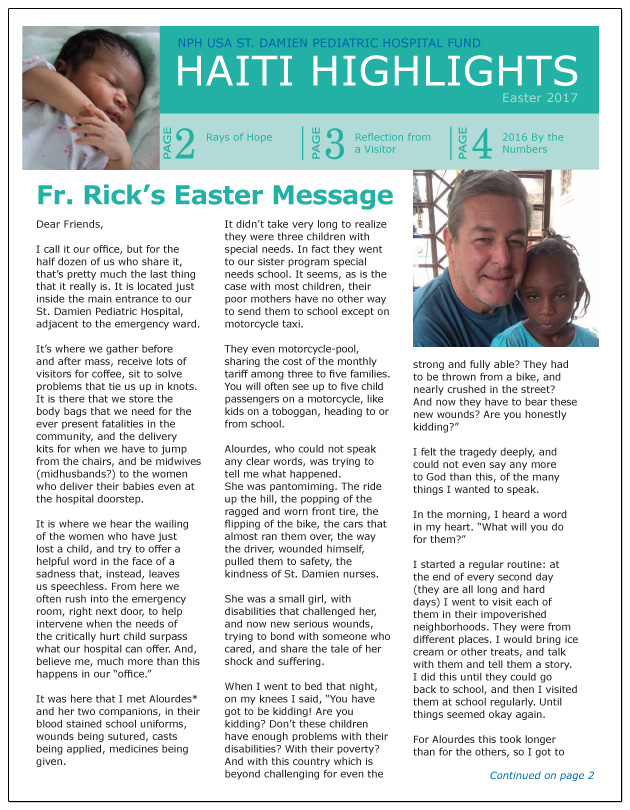 Haiti Highlights: Easter 2017 Newsletter (PDF)
Haiti Highlights: Easter 2017 Newsletter (PDF)
April 12, 2017
Click here to read our Newsletter featuring an Easter message from Fr. Rick Frechette, CP, D.O. If you would like to join our mailing list, please email jrayno@nphusa.org.
Amidst the chaos, fractured housing and penetrating unknowns, St. Damien Children’s Hospital is an oasis…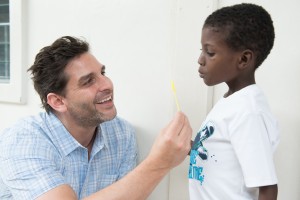
April 7, 2017
Angelo Rose, an attorney and musician from Rochester, NY, has been a great supporter of St. Damien. Following the 2010 earthquake in Haiti, he wrote a song to raise funds for the hospital, and last year he released a second song in response to Hurricane Matthew. Visit www.haitisrain.org to listen to his music.
Just this January he visited St. Damien and shared about his experience for our NPH USA blog. Click here to read his full reflection.
…
Hurricane Matthew Hits Haiti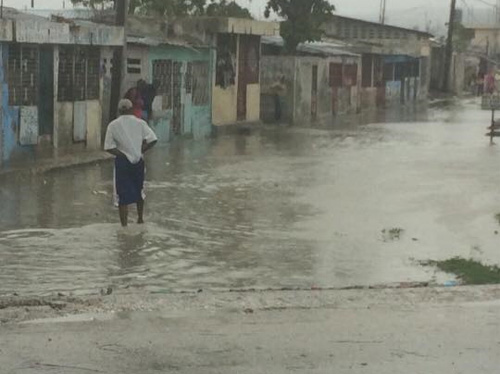
October 4, 2016
This morning, Hurricane Matthew, the strongest Caribbean storm in nearly a decade, made landfall in Haiti.
According to the National Hurricane Center, the Category 4 storm hit near Les Anglais around 7 a.m. Eastern. With sustained winds of up to 145 mph, it could dump up to 20 inches of rain on the lower elevations, and up to 40 inches in the mountains.
St. Damien’s expects a surge in health problems, including respiratory issues, diarrhea and cholera. The staff is working 24-hour shifts. Read more.
Making an HIV-Free Future a Reality in Haiti
July 21, 2016 as written by Denso Gay, Communication Officer, NPH Haiti on Crowd360.org
Haiti has made tremendous progress in recent years in its efforts against HIV and AIDS, reducing new infections, lowering AIDS-related deaths and increasing access to treatment. Yet, the small island nation still has a long way to go to be HIV-free. Fifty-five percent of all HIV-positive people in the Caribbean live in Haiti. As in many places, women and girls are disproportionately affected due to stigma and cultural practices, and as a result, Young women in Haiti are three times more likely to be HIV-positive than young men. One of the champions leading the charge for an AIDS-free generation in Haiti is Dr. Jenny Edouard and her dedicated team at St. Damien Pediatric Hospital.
Dr. Jenny Edouard has been fighting for an HIV-free Haiti since she graduated from medical school in Port-au-Prince in 2006. She now coordinates a public health and HIV program at St. Damien’s, a 224-bed pediatric hospital that provides over 80,000 medical services annually to children and their families. Dr. Edouard supervises a community health and HIV program that provides care to over 4,000 children annually with a particular focus on the elimination of mother to child transmission (EMTCT) of HIV.
“We’ve made huge strides towards eliminating mother to child transmission of HIV,” says Dr. Edouard. “Our EMTCT programs have been impactful, practical and effective in reducing HIV transmission in Haiti. Infant mortality has decreased and when mothers take part in the program, their children are given the chance to live HIV-free. Soon we hope we’ll see a new, healthy generation here.”
Dr. Edouard shares that “EMTCT is a challenge in Haiti. We see women delaying early prenatal care, we have trouble following up with our patients in rural areas, low hospital delivery rates, and most significantly, a stigma around HIV that leaves women afraid their partners may abandon them or resort to violence if they take part in the program. These are the things we are fighting against.”
“The EMTCT program saves lives–it’s that simple. The overall mortality rate of children born to HIV-positive mothers has significantly decreased as a result of this program. Women also find support in a new community free of fear of being stigmatized. They can talk with each other about their fears and concerns openly. Many become friends and educate other HIV positive pregnant women about the risk their infants face and how the EMTCT program can help,” Dr. Edouard recounts.
Since the beginning of St. Damien’s EMTCT program in 2011, Dr. Edouard and her team have worked with over 400 HIV positive pregnant women. The program’s current cohort includes 79 soon-to-be mothers. Dr. Edouard attributes part of the program’s success to its comprehensive approach which integrates HIV testing and counseling, nutrition services, and support for women affected by domestic violence.
“EMTCT services open the door for HIV care and treatment services not only for women, but also their partners and families. We believe that more investment in the EMTCT program could have a significant impact on maternal and child survival in Haiti among HIV-positive patients. Despite the many challenges we face each day we are incredibly proud to do what we do to take care of our patients,” says Dr. Edouard.
“Our HIV program with integrated EMTCT services is working incredibly well. Nearly all of the children of the HIV-positive pregnant women supported by our facility are HIV free. We’ve experienced several unfortunate budget cuts over the previous few years that have led us to lose staff. For this reason, we’re more grateful than ever for partners who are standing by these important programs.”
Radiology Technology has no Language Barriers
June 21, 2016 As posted on the inside.akronchildrens.org blog
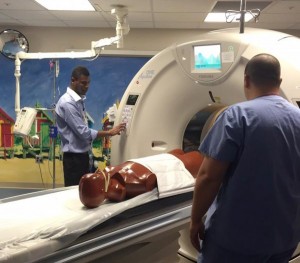 Claudin Destine is a radiology technician at St. Damien Children’s Hospital in Haiti. Claudin and 6 of his colleagues are spending 5 weeks training in their respective fields at Akron Children’s Hospital. In September, the Akron Children’s staff who works closely with them in Akron will travel to Haiti to complete the cycle and further their training and education at St. Damien. This program is supported through a grant from Rotary, which shares Akron Children’s vision of empowering our Haitian colleagues to care for the children of Haiti in a sustainable way.
Claudin Destine is a radiology technician at St. Damien Children’s Hospital in Haiti. Claudin and 6 of his colleagues are spending 5 weeks training in their respective fields at Akron Children’s Hospital. In September, the Akron Children’s staff who works closely with them in Akron will travel to Haiti to complete the cycle and further their training and education at St. Damien. This program is supported through a grant from Rotary, which shares Akron Children’s vision of empowering our Haitian colleagues to care for the children of Haiti in a sustainable way.
Here are Claudin’s reflections after a few weeks in Akron:
I want to extend a huge thank you in general to Akron Children’s Hospital and specifically to Dr. Jeff Kempf and Dr. Brittany Potts and the Radiology staff. (Mike Whittenberger, Carol Arteno, Amy Lutyj and Robin McHenry)
In some ways I am like a child being raised by St. Damien and Akron Children’s. As a child your brain is blank and through training and repetition, you are able to learn new skills. St. Damien recognized my potential and chose me to participate in this life-changing opportunity.
The CT staff at ACH has been incredibly patient with me and taught me new concepts — including how to use the machine, anatomy and much more. Even though I don’t speak English, they have been accommodating and make every effort to ensure my understanding. They take their time and reinforce concepts that are difficult to comprehend.
The things that I am learning will help me serve countless patients in my country of Haiti. I can never thank you enough and will not stop seeking the knowledge of the wise and understanding.
To the staff in CT: A huge thank you. Keep up the good work! You aren’t told thank you often enough. I am also thankful for the courage and strength of everyone who participated in arranging this training.
Learning How to Better Care for Children in Haiti
June 2, 2016 by Edna Benjamin Pierre Louis, as posted on the inside.akronchildrens.org blog
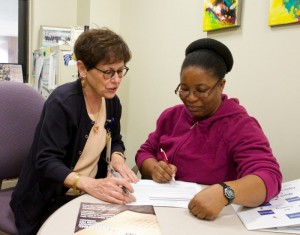 Edna Benjamin Pierre Louis is the director of nursing at St. Damien Children’s Hospital in Haiti. Edna and 6 of her colleagues are spending 5 weeks training in their respective fields at Akron Children’s Hospital. In September, the Akron Children’s staff who works closely with them in Akron will travel to Haiti to complete the cycle and further their training and education at St. Damien. This program is supported through a grant from Rotary, which shares Akron Children’s vision of empowering our Haitian colleagues to care for the children of Haiti in a sustainable way.
Edna Benjamin Pierre Louis is the director of nursing at St. Damien Children’s Hospital in Haiti. Edna and 6 of her colleagues are spending 5 weeks training in their respective fields at Akron Children’s Hospital. In September, the Akron Children’s staff who works closely with them in Akron will travel to Haiti to complete the cycle and further their training and education at St. Damien. This program is supported through a grant from Rotary, which shares Akron Children’s vision of empowering our Haitian colleagues to care for the children of Haiti in a sustainable way.
Here are Edna’s reflections after her first week in Akron:
On Monday, May 23, I met an extraordinary woman. Janet Rogers is the director of critical care, emergency departments and specialty care units at Akron Children’s Hospital. Janet is leaving a huge impression on me, starting with the kindness she has shown me throughout my first week.
She introduced me to several other managers and directors who were also very welcoming.
I had the opportunity to attend several meetings with Janet. At the beginning, I didn’t understand how the hospital functioned but after only a short time, I understood so much more than when I started. I was happy to see how everyone works as a team here. Although there are many people involved, they function as a unified team and I was impressed to see how well everything is coordinated and planned.
Janet further impressed me with the way she equitably handles conflict that arises in the workplace. She also never tires of my questions. I never ask questions during meetings, instead when I want to better understand something, I ask Janet about it after the meeting and she is always available to answer my questions.
This week was a great week for me and I hope to continue to take advantage of every minute I spend with the great staff at Akron Children’s, especially Janet.
Thank you Janet and thank you to everyone who has worked with Janet and I this week!
I would also like to thank Dr. Jeff Kempf and Dr. Brittany Potts for allowing me to participate in this beautiful experience in nursing administration at Akron Children’s Hospital and to everyone else who helped develop this training program. I also cannot forget to thank the Rotarians from Ohio and Port au Prince.
Update from Father Rick Frechette, NPH Haiti National Director
April 20, 2016
Dear Friends,
Today marks two weeks since the motorcycle accident on the way from Titanyin to Tabarre (after burial of the destitute dead), left myself and two other members of our team wounded.
I was airlifted out of Haiti with a serious internal bleed, treated with excellent care in Haiti and at Ryder Trauma Center in Miami, and in fact was hospitalized only a day and a half at Ryder because of this excellent care.
Look at the richness of the generosity toward myself when I was in urgent need (a priest suddenly a penitent, a doctor suddenly a patient, and a strong leader suddenly a fallen team member):
•I was airlifted from Haiti to Miami
•I was give first class treatment and a private room at Ryder Trauma (Jackson Memorial Hospital)
•The Archbishop of Miami was offering the cathedral rectory for my convalescence
•The papal Nuncio in Haiti was asking for me, as well as the Permanent Observer of the Vatican at the UN
•My CT scans and case were reviewed even by a trauma physician of the White House
•My case was reviewed with mutual discussion between Ryder and Mayo Clinic (Scottsdale)
•Mother Theresa’s Sisters came to the hospital and laced me with Holy Medals
•I spent some days of convalescence at the Miami home of Veronica and Andrea Bocelli
•And more days of convalescence at the impressive retreat house of The Passionists at North Palm Beach
This was all just frosting on the cake, the cake being all the efforts on every side to organize the saving of my life (from hemorrhagic shock).
My friends and the docs in Haiti, Phil Hurley who accompanied me and stayed with me in USA, Fr. Enzo who has been with me the whole time, and all your messages of support and prayer. It is very moving and wonderful.
St. Paul was knocked off his horse, and remained blind until he could see in a new way, that was useful to the building of God’s reign.
I was knocked off this motorcycle, and began right away re-seeing many things which had become somewhat dormant over these years, yet were part of my original calling to try to be useful to the building of God’s reign.
Dormant yet reawakened.
As I was cared for so graciously, I often pictured the other two injured team members, Emmanuel and Lenz. I pictured them in their shanty shacks, lying on the floor, far from water and toilettes and help if they needed it. I called them often to see how I could send medicines, some clothes, have them reevaluated.
My own great care made me aware of their limited care, and eager to try to fill in the gaps that I could.
I missed for them what I had for myself. I am glad I had it. I miss it for them. I am more committed than ever to try to even the field of blessing, to make it reach the poorest of people.
My own great care made me picture the children at St. Damien Hospital.
I would see them in my hours and hours of sleep. Wishing for all of them the same courtesy, the same first class treatment, the same kind greetings and promise of prayer, that I have known. It is fully its own powerful medicine.
I have been held up by love and its healing force. I am more committed to spreading this powerful medicine as well, to the people far from this blessing.
This time of convalescence is a great satisfaction to me: it is the proof that I have set up strong and independent leaders and teams in Haiti, who know what to do and don’t need me to be there.
I am eager to get back to my work though.
I am in minimal pain. I still have a foley catheter, which I may need for another 3 weeks. I am healing from the hemorrhages as I should. I need a few more consultations with Urology for a small tear.
I take nice walks on the beach, hoping the urine leg bag is not showing beneath my shorts!
I will be fine, and return to Haiti very likely within one month. (I sure hope sooner!)
Thank you for your help, your concern, your friendship, your prayers.
Be sure of mine for you.
God bless you,
Fr. Rick Frechette
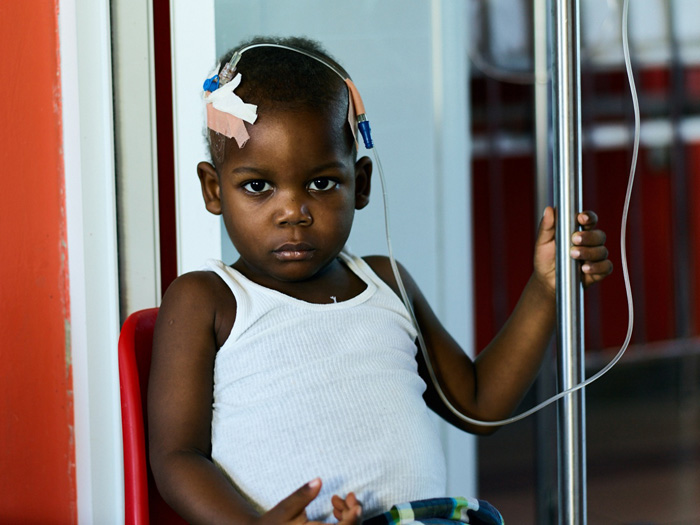 Documenting the daily life within a Haitian hospital
Documenting the daily life within a Haitian hospital
By Jens Honoré
February 2, 2016
Danish-born photographer Jens Honoré recently had the opportunity to visit St. Damien’s in order to photograph the daily life within the hospital. Read his blog post about his experience.
Photo (c) 2015 Jens Honore / CPi reps
The Bendix Company Makes a Priceless Gift of Laptops and Training
Reported by Denso Gay, Communication Officer, NPH Haiti
November 10, 2015
Twenty-five new laptops were donated to the NPH Haiti St. Damien Pediatric Hospital by the Bendix Company, which is part of the Global Care Foundation. According to a Bendix manager, their employees were strongly motivated to help after seeing the laptop donation project on the nph.org website.
In addition to donating the laptops, Bendix also generously delegated specialists to come to Haiti for an onsite computer training at St. Damien Hospital that lasted from September 22ndto September 24th. Fifty-seven St. Damien employees participated in this training. Basic and intermediate classes were provided along with a specific class designated for the administration staff. Participants had the opportunity to significantly expand their knowledge in Microsoft Word, Excel, PowerPoint, and Outlook.
From now on, St. Damien employees will be able to accomplish their work in a more efficient way. For instance, this generous donation will help us in our surgery center to quickly schedule surgeries and make changes to schedules in case of emergencies. The social services department will use their laptops to attend to patients and families by helping them to deal with difficult situations with sick children. Department coordinators will be able to better manage their extensive caseload and reporting. In the Emergency Room and in the Intensive Care Unit, the laptops will help to electronically send laboratory analyses and x-rays directly to these rooms.
According to Mario Flores, the Program Manager of Bendix, “This was a great training for the staff which in turn will help support the vital services that this hospital is offering its patients. We are glad to be a part of the process and to help.” Bendix has committed to assist with continued professional development and training.
St. Damien staff that participated received a completion certificate on the last day of training. On behalf of the St. Damien Pediatric Hospital, we want to express a huge thank you to the Bendix Company for their generous support. The laptops and training will help our hospital to continue providing the highest quality of care treatment for disadvantaged and ill children in Haiti.
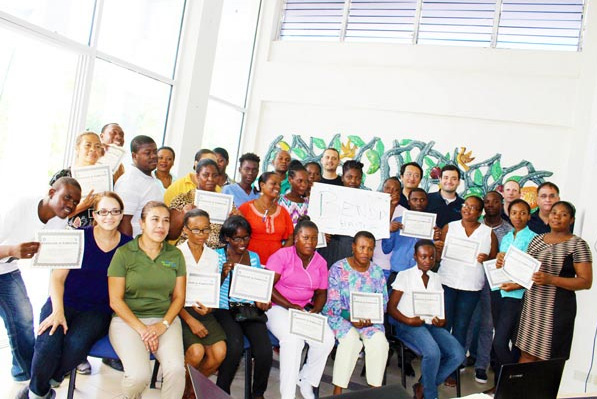
44th Annual Corn Sale in Support of St. Damien Pediatric Hospital
Reported by Marcia Mendola
Photos taken by parishioner Gary Eisenhart
September 22, 2015
Friends of St. Damien Pediatric Hospital, please join us in celebrating the results of our 44th Annual Corn Sale. The background of this amazing story lies with the Roger and Betsy Powers Farm family in Pittsford, NY. Wanting to lessen World Hunger 44 years ago, Roger and his wife Betsy and their very small children offered to our then pastor to plant and harvest acres of corn; and then donate it to our church gratis to raise money to feed the hungry. Today with the blessing of our next 4 pastors, Roger and Betsy with their children and grandchildren are still planting and harvesting the corn and bringing it by wagon freshly picked before every one of our church’s 5 masses. Over the last 2 decades, NPH has been the beneficiary.
We are happy to announce the 2015 Corn Sale at St. Louis Church in Pittsford, NY, raised $2,511. During Mass parishioners prayed for the efforts of Fr. Rick and all who work at St. Damien’s; and outside after Mass the Powers Family and St. Louis’ Haiti Task Force sold the freshly picked corn in the pouring rain.
In addition, the first $1,000 of the parish September 12/13 tithe will be sent to the St. Damien Pediatric Hospital Fund along with the $2,511 raised!
THANK YOU TO ALL INVOLVED!

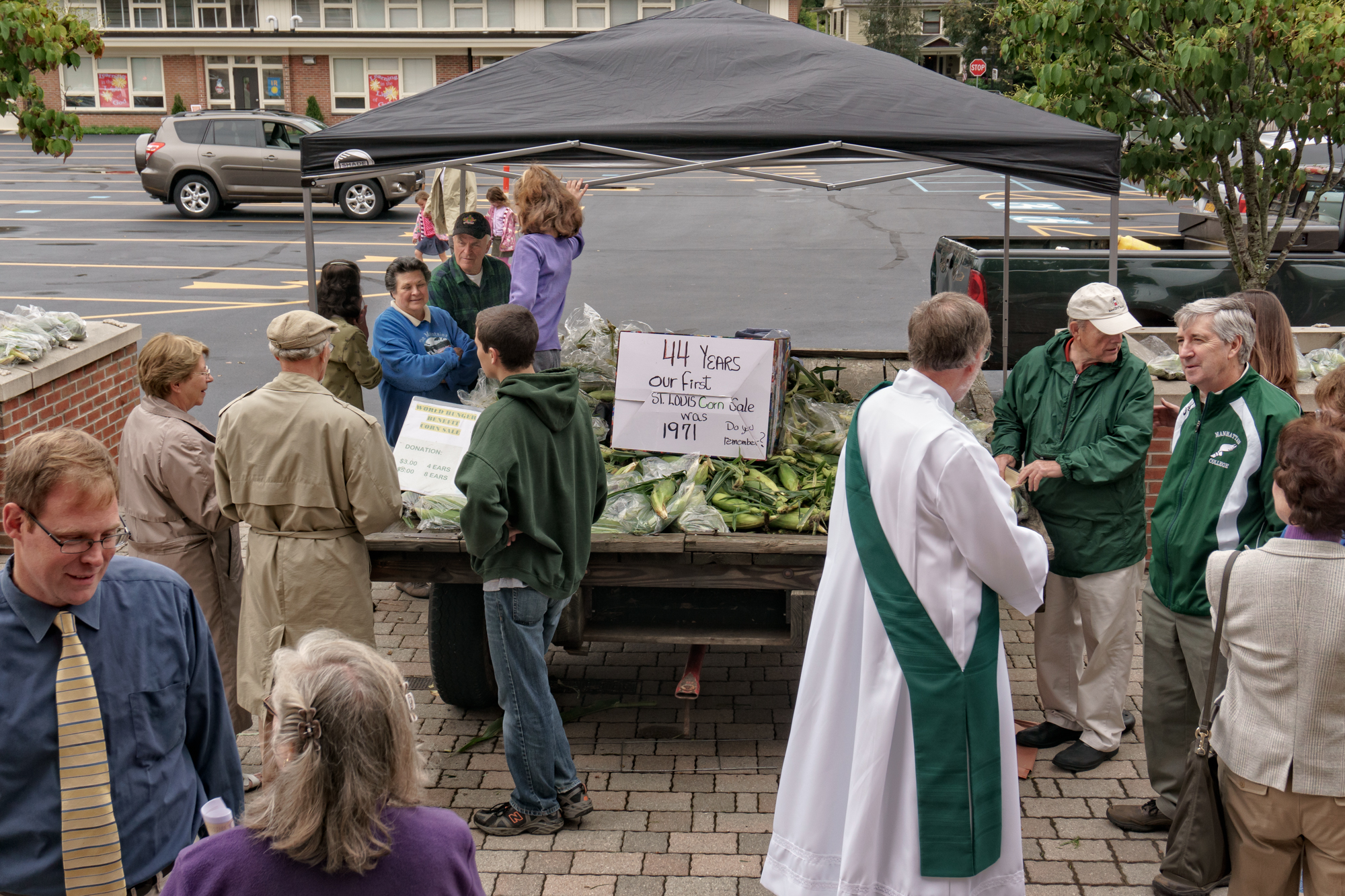
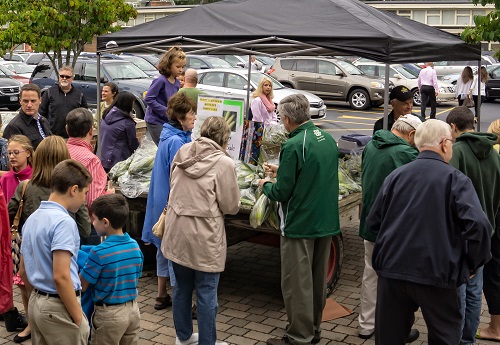
Beyoncé Visits St. Damien Pediatric Hospital!
by Fusion and Danielle Wiener-Bronner
June 6, 2015
More than five years after Haiti was struck by a devastating earthquake, the nation’s children remain at risk. According to The World Bank, the under-5 mortality rate was especially high at 174 per 1,000 live births in 2010 — the year of the earthquake. But since then, the number has been consistently, if slowly, dropping to pre-earthquake lows. In 2011, the number fell to 77 and as of 2013, the latest year on record, the rate is 73 per 1,000 live births.
To learn more about how the country has fared since the disaster, Beyoncé decided to take a humanitarian trip to Haiti in May. While there, the world-famous singer, songwriter and actor went to one hospital working to suppress child mortality rates — St. Damien Pediatric Hospital in Tabarre, Haiti. Founded by Nuestros Pequeños Hermanos (NPH), the hospital was initially supposed to serve as a home for children with no families. But the institution changed its mission. Per the hospital website: “… the large amount of children dying from treatable illnesses showed a desperate need for a hospital that could treat chronic and other debilitating pediatric illnesses.”
Watch the ABC News/Fusion exclusive video here, provided by Parkwood Entertainment, to see what Beyoncé witnessed in Haiti.
The hospital’s medical director, Dr. Jacqueline Gautier, said in a video showcasing Beyonce’s visit that pneumonia, a treatable infectious disease, is one of the top killers of children in Haiti. Says Gautier of the disease, “Even though it is easily treated, if parents don’t have access because of money for transportation, because of money to pay for antibiotics, and did not show up early, then the children can die.”
Every day, said Gautier, 150 children show up for treatment at the hospital doors. But Gautier says St. Damien Pediatric Hospital doesn’t have the capacity to treat everyone: “It’s heartbreaking sometimes to send children away, but many times we have no choice.”
You can help support St. Damien by purchasing a BeyGOOD Haiti t-shirt. All proceeds will go to helping the hospital, which has been forced to close a wing for lack of funding.
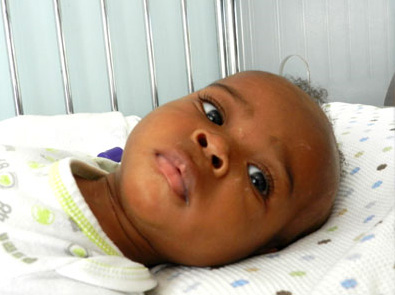 Interview with a Mother Whose Son was Treated at St. Damien Due to Malnutrition
Interview with a Mother Whose Son was Treated at St. Damien Due to Malnutrition
March 1, 2015
Where are you from and how long did it take to get to St. Damien Hospital?
I am from Morne Calavire, a suburb of Port-au-Prince. I travel approximately one hour to get to the hospital, but only if traffic is light.
What do your living conditions look like?
I don’t have a house; instead I am living with my six children in a single room I have rented. My oldest son is 22 and the smallest is one year old. Life is not easy for us. The father of my 4 oldest kids died, and the father of the other two does not support me – he doesn’t have anything to give. So we live day by day, hoping to make it through. When we receive help, I am happy and the day is saved, but if we don’t get anything, we have to accept it as it is. That’s why my youngest son fell sick. With the money I have, we are not even able to make it through the day. That’s why we are barely able to manage an additional burden like illness.
Our living conditions are awful, especially when it rains. The water is coming into the room from every corner, from the roof and the walls. It isn’t only difficult during the rain, but afterwards as well, because there is mud everywhere around the flat.
How did you know about St. Damien Hospital?
I knew the old hospital of NPH Haiti in Pétionville. One of my children was treated there for lung problems a few years ago. That was a pleasant experience for me back then because I was not reduced to being a lower class person, and my child was the center of attention.
After the earthquake the hospital in Pétionville was destroyed, and I didn’t know that NPH Haiti built a new pediatric hospital in Tabarre. I only heard about it later on from friends who told me that the pediatric hospital St. Damien is also run by NPH Haiti, and they passed me the address.
When did you arrive at St. Damien with your child?
I first came to St. Damien hospital on October 13, 2014. I went to several other hospitals before that, but no one was able to really help me.
How long has your child suffered from malnutrition? How does the hospital help you and your child?
Back then, I worked for the city cleaning service, but I lost the job. I could not afford to live in our old flat anymore so we had to move somewhere else. But the new flat is always very damp because of the rain; we have to wait until it stops raining before going to bed, otherwise everything will be wet. Shortly after moving into the new flat my youngest son showed the first symptoms. Since he was about seven months old, I knew that something was wrong with him. He had fever constantly – at times very high fever- he got a cold frequently and coughed a lot. Sometimes he coughed without stopping, and then he became thinner and thinner and had problems breathing properly.
I’ve been to another medical center in Pétionville with my son where they checked him and subscribed him numerous medications. Thanks to the help of a friend I was able to buy these medications. But even though my son took the medication, nothing changed, and I saw no sign of improvement. I was so desperate that I started talking about our plight to neighbors and friends. Following that, a friend gave me 250 Gourdes for the transportation to take my son to St. Damien. Here at St. Damien they did a lot of tests, analyzed them in the laboratory, and finally detected that my son suffered from tuberculosis. He overcame the tuberculosis, but due to malnutrition they continue to treat him here. Now, when I look at him, it is already the best outcome I could expect, because before that he did not look healthy at all. Despite support he was not able to stand, he was all skin and bones, like a living skeleton. Now, he plays, is lively, and laughs a lot. That means the most to me, because that is what a mother wishes for: a smiling child.
How would you rate the help your child obtained at St. Damien?
They gave me everything I need for my son. Apart from the medication, they also provided milk and special nutrition for the little one. The food is a wide variety and above all, he is given meals on a regular basis; that’s why he already looks much better.
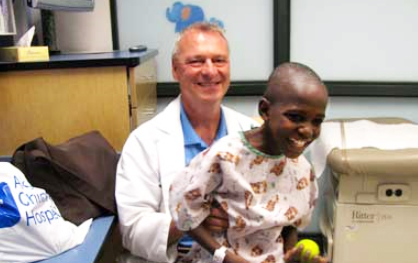
Heart Program for Haiti
Reported by Denso Gay, Communication Officer, NPH Haiti
November 24, 2014
Dr. Jeff Kempf and his wife Dr. Ellen Kempf, from Akron Children’s Hospital, started visiting NPH Haiti’s St. Damien Pediatric Hospital shortly after the tragic earthquake hit in 2010. After several visits to the hospital and recruiting other key doctors, nurses and technicians from his hospital, Jeff and his team began a cardiac surgical program in April 2012. Jeff and his family have been welcoming two to four children in their home while they undergo heart surgery at Akron Children’s Hospital. After they recover, they return to Haiti with healthy hearts and smiling faces.
On October 7, 2014, two more children from Haiti traveled to Ohio with a guardian to receive heart surgery. Samson* and Carlo* were nervous to board the plane, but relaxed once they arrived at their temporary home, met their new friends, and met their doctor. One of the little boys even celebrated a birthday during the visit! Both boys have recovered from surgery flawlessly, and three weeks after the operation they were on a plane again to return home to Haiti. They were sad to say goodbye to their friends in Akron, but they were thrilled to return home and see their families. Thanks to the collaboration and partnership of Akron Children’s Hospital, Rotary International, Gift of Life and St. Damien Pediatric Hospital for making this happen!
These two little boys were not the only visitors from Haiti in Akron during the fall months. Akron also welcomed several staff members from St. Damien for an important training to start a cardiac surgery program at St. Damien in the next year. Doctors, nurses, pharmacists, maintenance and administration members of St. Damien staff attended a six-week training to implement a new cardiac program at the hospital upon their return to Haiti. This is a huge step for St. Damien and the overall goal that was established back in 2012 when the first two heart patients were sent to Akron to receive surgery. The hope is that the first surgery will be performed in March 2015. We are extremely proud of this improvement for the hospital and our staff!
Thank you again to Akron Children’s Hospital for the dedication to our hospital, our staff and our patients that you continue to show.
If you would like to make a gift to support St. Damien’s, please click here.
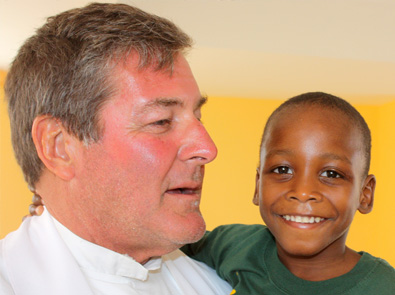 St. Helenans Reach Out to Sick Children in Haiti
St. Helenans Reach Out to Sick Children in Haiti
by Judy Barrett
North Coast Catholic
September 2014
Port-au-Prince, Haiti—Last year St. Helena Church in Napa County welcomed Fr. Rick Frechette, CP, who has spent the past 25 years as a visiting missionary priest in Haiti.
Initially sent there to establish a home for orphaned and abandoned children, he soon recognized the great need for their medical care and started a clinic that has grown into St. Damien Pediatric Hospital, arguably the premier pediatric hospital in Haiti. Along the way he completed medical school.
Some parishioners and friends from neighboring Napa Valley parishes were so moved by Fr. Frechette’s message about the plight of the “poorest of the poor” in Haiti that they organized an informal group to provide ongoing financial support for St. Damien under the guidance of Msgr. John Brenkle, St. Helena Church’s retired pastor. The group meets every other month for a brief social hour, update about the hospital, and sharing of ideas and information. Through July 2014, the group has donated $128,072 to the hospital.
Additionally, during the 2013–14 school year, seventh and eighth grade students at St. Helena School raised roughly $250 to help sick children treated at the hospital.
- A few facts that moved the group to adopt St. Damien as an ongoing project include these:
- Haiti is the poorest nation in the Western Hemisphere. Over 80 percent of the population lives on less than $2 per day.
- In Haiti there is 1 doctor for every 15,000 people; in the United States there is 1 doctor for every 500 people.
- One Haitian child in four is moderately to severely malnourished. Malnutrition is the leading cause of death in children.
- 10 percent of Haitian children die before their fifth birthday, largely from treatable diseases.
To join the St. Helena “Friends of Haiti” group, contact Msgr. John Brenkle at 707-968-9375 or Judy Barrett at 707-942-6143. The next meeting is at 5 p.m. on September 8. The only requirement is your concern for poor children in Haiti and a willingness to make a monthly or quarterly gift in any amount.
For information about St. Damien Pediatric Hospital, visit www.nphusa.org/stdamien. St. Damien is operated by Nuestros Pequenos Hermanos (NPH, Spanish for “Our Little Brothers and Sisters”), an organization that serves orphaned, abandoned, and disadvantaged children in Latin American and Caribbean countries.
Chikungunya in Haiti
Updated by Reported by Denso Gay, Communication Officer, NPH Haiti
June 18, 2014
Chikungunya – threat of epidemic increases in the Caribbean
Since late 2013, the Chikungunya outbreak in the Caribbean and Haiti has been gathering momentum. By May 6, 2014, the number of cases rose from one to 15,000. As of June 2014, 27,000 cases were confirmed.
Chikungunya is a viral disease that is transmitted to people by the Aedes species mosquitoes. Symptoms usually last begin 2‒6 days after being bitten by an infected mosquito and the most common symptoms are fever and severe joint pains, often in the hands and feet. Chikungunya can cause the appearance of “stooped walking” not only because of the pain, but it also causes fatigue. Rheumatic effects may persist for several months and even years.
There are no antiviral medicines to treat Chikungunya. Treatment is only symptomatic and administration of medicine help reduces the fever and pain.
At St. Damien Pediatric Hospital, we have experienced an increase of Chikungunya cases because often people are refused at other hospitals, due to the lack of healthcare centers in Haiti. The capacity of the St. Damien emergency room does not allow us to host the increase in positive cases, therefore we are able to provide hydrotherapy and paracetamol (analgesic) before we transfer them, if they can make it to another hospital. Patients that are admitted to our ER, typically have a very high fever and body pain so severe that they do not want to be touched.
Baby Jean, who was just five days old and born at home, was able to receive care at St. Damien. The Chikunguya virus can be transmitted by mother to the newborn if the mother catches the disease perinatally, so Baby Jean could have contracted the disease from her mother, or from a mosquito. A few days after her birth, she started showing signs of a fever. Concerned that it might be Chikungunya, her mother quickly found a motorcycle to take them from Cite Soleil to St. Damien. Baby Jean’s body was pale when she arrived at St. Damien. The nurses and staff quickly attended to her, starting an IV and began treatment by administering paracetamol. With the help of the ER physician and staff, Baby Jean is feeling better, although she does not like to be touched due to her body aching. She will spend another four to five days in the hospital.
An average stay for in-patient care is $52 per day, with an average stay of five days, for a total of $260. If a patient is seen in our outpatient clinic, it is a one-time fee of $32.
St. Damien staff had 100 staff members became ill with Chikunguya and many had to be temporarily replaced to provide uninterrupted care to our patients. We paid approximately $3,800.00 for replacement staff for roughly 150 sick days.
Since the last week of April, St. Damien has provided care to 112 Chikunguya outpatient cases and hospitalized 14 patients. We ask for your continued support in caring for these children, to help decrease their suffering and pain.
On January 28, 2014, a special reception to benefit St. Damien’s was held at the home of Paul and Marie Christine Katz with sponsorship by The ELMA Philanthropies Services (U.S.) Inc. It featured the hospital’s Fr. Rick Frechette and Dr. Jacqueline Gautier.
To learn more about the St. Damien Pediatric Hospital Fund, please contact Jennifer Rayno at jrayno@nphusa.org.
St. Damien Pediatric Hospital – Related Information:
• St. Damien Pediatric Hospital Fund
• Programs
• Fact Sheet
• Our Impact 2021
• Hospital Report
• Fundraisers Guide
• Malnutrition Program
• Profile: Fr. Rick Frechette, CP, D.O.
• Profile: Dr. Jacqueline Gautier
• NPH Haiti Fact Sheet
• VIDEO NPH Haiti St. Damien Pediatric Hospital 2017
• VIDEO: Not One Be Lost
• VIDEO: St. Damein Pediatric Hospital 2013
• VIDEO: NPH Haiti St. Damien Residency Program
• VIDEO: NPH Haiti Hospital 2006
• BLOG








